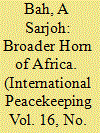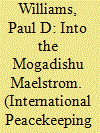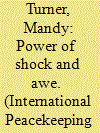| Srl | Item |
| 1 |
ID:
092128


|
|
|
|
|
| Publication |
2009.
|
| Summary/Abstract |
This article analyses the challenges confronting the international community as it tries to deal with the conflicts in the Broader Horn of Africa through peacekeeping. The contention of the article is that peacekeeping efforts in the region are undertaken in a strategic vacuum, thus undermining efforts at resolving the conflicts. Peace operations deployed across the Broader Horn are not synchronized with the political processes, and this is exacerbated by five interrelated challenges: the lack of a political framework; the lack of consent; the issue of protection; the issue of overstretch; and US counter-terrorism policy. The article concludes by calling for the development of a strategic regional framework aimed at reconciling national, regional and international interests that are often in conflict. While deployment of peacekeepers may be part of that framework, it should not be a substitute for viable political processes.
|
|
|
|
|
|
|
|
|
|
|
|
|
|
|
|
| 2 |
ID:
092127


|
|
|
|
|
| Publication |
2009.
|
| Summary/Abstract |
For a long time analysts of war-torn societies have understood post-conflict situations primarily as processes of transition towards consolidated statehood. This perspective is increasingly considered unsatisfactory in that it raises false expectations of state-building processes and conceals important dynamics unfolding in situ. This article formulates an integrated analytical framework that allows for characterizing and assessing the dynamics in post-conflict polities. It is argued that any post-conflict polity can be characterized by focusing on the interactions between three post-conflict actors - the formal government, external actors and informal powers. In a second step Amartya Sen's capability approach is used as an analytical benchmark for measuring state-building achievements. Subsequently, the analytical framework is applied for comparing two diverse post-conflict environments, Mozambique and Liberia, in order to illustrate the potential and limitations of the analytical framework.
|
|
|
|
|
|
|
|
|
|
|
|
|
|
|
|
| 3 |
ID:
092129


|
|
|
|
|
| Publication |
2009.
|
| Summary/Abstract |
The African Union mission in Somalia (AMISOM) endured a difficult first 30 months of operations. Deployed into an active war-zone, it was not long before an international debate began to revolve around how the mission should be brought to an end. This article analyses the main challenges as well as the most important local and international dynamics that affected the operation. It concludes that AMISOM was an ill-conceived mission that attracted few serious political champions partly because of the dangerous environment in which it operated and partly because of its lack of stable funding and capabilities. The predictable results were a dangerously under-resourced operation that placed peacekeepers in harm's way for morally and politically dubious reasons.
|
|
|
|
|
|
|
|
|
|
|
|
|
|
|
|
| 4 |
ID:
092126


|
|
|
|
|
| Publication |
2009.
|
| Summary/Abstract |
Despite a growth in social studies of peacekeeping, there has been little written on field experiences in such contexts. This article examines the role of the researcher in influencing the research process and product in two peacekeeping sites, Liberia and Kosovo. Although researchers are often positioned in powerful ways vis--vis researchees, the multiplicity and complexity of their positionality are often overlooked. By drawing on examples from team research conducted, the article suggests that these positionings give rise to unconventional and contradictory power relations. By reflecting on the role of the researcher(s) and the politics of research itself, we hope to engender more conscientious peacekeeping research.
|
|
|
|
|
|
|
|
|
|
|
|
|
|
|
|
| 5 |
ID:
092132


|
|
|
|
|
| Publication |
2009.
|
| Summary/Abstract |
This article charts the development of the Palestinian Authority from its creation as an interim authority under the Oslo Accords towards becoming a failed (quasi-)state. By 2009 - 15 years after its inception and ten years after the proposed final status negotiations - the PA was split between a criminalized isolated entity in Gaza under the control of Hamas and an internationally recognized 'caretaker government' in the West Bank under the control of Fatah and donor-supported technocrats. The role of violence - i.e. the power of 'shock and awe' - in the creation of this failed (quasi-)state is emphasized: Israel's 2002 military campaign, Operation Defensive Shield, the sanctions and blockade imposed after the election of Hamas in January 2006, and the violence on the Palestinian street which split the PA in two. The article concludes by arguing that the PA failed (quasi-)state is presiding over the demise of the Palestinian dream of a viable state comprising both the West Bank and Gaza.
|
|
|
|
|
|
|
|
|
|
|
|
|
|
|
|
| 6 |
ID:
092131


|
|
|
|
|
| Publication |
2009.
|
| Summary/Abstract |
This article analyses the ways in which rapidly emerging narratives of EU-UN cooperation in military crisis management are rewriting and re-authorizing European practices of military intervention in Africa. By problematizing the underlying assumptions, this article points to the increasing significance of uncertainties about the location of contemporary political life, the location of 'crisis management', and thus to the diverse effects of a crisis management approach to African conflicts. Hence, this article problematizes and challenges a range of powerful normative claims about 'EU crisis management'. The emerging narratives are practices of knowledge and space that shape EU-Africa relations and that create new spaces of intervention, thus establishing and enabling relations of authority and control. Last, the article discusses briefly how such practices worked in the case of EUFOR Tchad/RCA (European Forces in Chad and the Central African Republic).
|
|
|
|
|
|
|
|
|
|
|
|
|
|
|
|
| 7 |
ID:
092130


|
|
|
|
|
| Publication |
2009.
|
| Summary/Abstract |
Local peace initiatives have been introduced in post-conflict settings in aid of statebuilding processes. However, contradictions in such efforts that undermine the state become apparent in a development context when government institutions are, generally, functioning. Peacebuilding initiatives in the arid lands of Kenya are a good example of this. While they have proved successful in resolving conflicts at the local level, they challenge the state structure in three ways. First, some of their features run counter to the official laws of Kenya and jeopardize the separation of powers. Second, they pose a dilemma, since their success and legitimacy are based on grassroots leadership and local concepts of justice. Both can be at odds with democratic decision-making, inclusiveness and gender equity. Third, they provide yet another tool for abuse by politicians and other local leaders. This reveals a dilemma: aspects of peacebuilding can actually undermine a statebuilding endeavour.
|
|
|
|
|
|
|
|
|
|
|
|
|
|
|
|